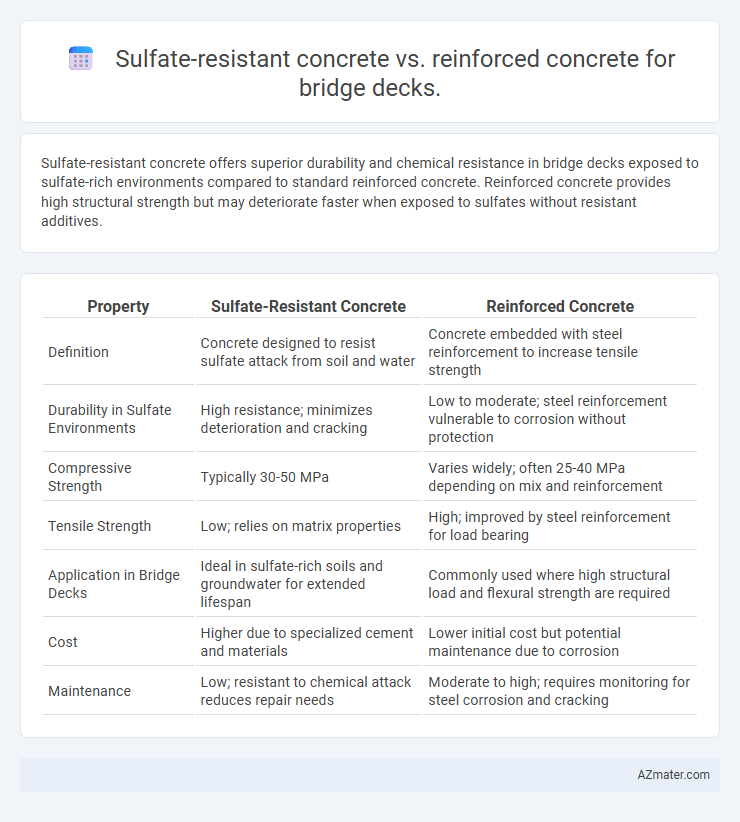Sulfate-resistant concrete offers superior durability and chemical resistance in bridge decks exposed to sulfate-rich environments compared to standard reinforced concrete. Reinforced concrete provides high structural strength but may deteriorate faster when exposed to sulfates without resistant additives.
Table of Comparison
| Property | Sulfate-Resistant Concrete | Reinforced Concrete |
|---|---|---|
| Definition | Concrete designed to resist sulfate attack from soil and water | Concrete embedded with steel reinforcement to increase tensile strength |
| Durability in Sulfate Environments | High resistance; minimizes deterioration and cracking | Low to moderate; steel reinforcement vulnerable to corrosion without protection |
| Compressive Strength | Typically 30-50 MPa | Varies widely; often 25-40 MPa depending on mix and reinforcement |
| Tensile Strength | Low; relies on matrix properties | High; improved by steel reinforcement for load bearing |
| Application in Bridge Decks | Ideal in sulfate-rich soils and groundwater for extended lifespan | Commonly used where high structural load and flexural strength are required |
| Cost | Higher due to specialized cement and materials | Lower initial cost but potential maintenance due to corrosion |
| Maintenance | Low; resistant to chemical attack reduces repair needs | Moderate to high; requires monitoring for steel corrosion and cracking |
Introduction to Bridge Deck Concrete Types
Bridge deck concrete types primarily include sulfate-resistant concrete and reinforced concrete, each designed to address specific environmental and structural challenges. Sulfate-resistant concrete is formulated with low-tricalcium aluminate cement to withstand sulfate attack in aggressive soil or water conditions, enhancing durability and longevity. Reinforced concrete incorporates steel reinforcement bars to improve tensile strength and load-bearing capacity, making it suitable for heavy traffic and dynamic bridge loads.
Overview of Sulfate-Resistant Concrete
Sulfate-resistant concrete is specifically designed to withstand aggressive sulfate environments commonly found in bridge deck foundations near marine and industrial areas, preventing sulfate-induced deterioration and expansion. This type of concrete incorporates low C3A clinker, supplementary cementitious materials such as fly ash or slag, and optimized mix designs to enhance durability and reduce permeability. Compared to conventional reinforced concrete, sulfate-resistant concrete significantly improves the longevity and structural integrity of bridge decks exposed to sulfate-rich soils and waters.
Understanding Reinforced Concrete
Reinforced concrete for bridge decks integrates steel reinforcement bars to enhance tensile strength, providing durability under heavy traffic loads and dynamic forces. This composite material resists cracking and deformation better than plain concrete, ensuring longer structural integrity and safety. Understanding the synergy between concrete and steel reinforcement is crucial for optimizing load distribution and extending the lifespan of bridge infrastructures.
Key Material Properties Compared
Sulfate-resistant concrete features low permeability and enhanced chemical durability due to its reduced tricalcium aluminate content, making it highly resistant to sulfate attack in aggressive environments. Reinforced concrete incorporates steel reinforcement bars, providing superior tensile strength and load-bearing capacity essential for bridge deck structural performance. Comparing both, sulfate-resistant concrete excels in durability under sulfate exposure, while reinforced concrete ensures necessary mechanical strength, often leading to their combined use in sulfate-prone bridge decks for optimized longevity and safety.
Durability in Aggressive Environments
Sulfate-resistant concrete, designed with low C3A content and supplementary cementitious materials like fly ash or slag, exhibits superior durability in sulfate-rich aggressive environments compared to conventional reinforced concrete. It resists chemical attacks and minimizes expansion, cracking, and spalling, thereby extending the lifespan of bridge decks exposed to sulfate-bearing soils or groundwater. Reinforced concrete without sulfate resistance is more prone to degradation, reinforcement corrosion, and reduced structural integrity in such harsh conditions.
Corrosion Resistance and Longevity
Sulfate-resistant concrete offers enhanced corrosion resistance for bridge decks by minimizing sulfate attack from aggressive environments, leading to improved durability in sulfate-rich soils or wastewater exposure. Reinforced concrete provides high structural strength, but steel reinforcement is prone to corrosion without adequate protection, reducing the longevity of the bridge deck. Combining sulfate-resistant concrete with corrosion-inhibiting strategies significantly extends bridge deck service life by mitigating reinforcement degradation and maintaining structural integrity.
Structural Performance on Bridge Decks
Sulfate-resistant concrete offers enhanced durability in bridge decks exposed to sulfate-rich environments, preventing chemical attacks that compromise structural integrity. Reinforced concrete provides superior tensile strength through embedded steel reinforcement, supporting heavy loads and dynamic traffic stresses. Combining sulfate resistance with reinforced concrete ensures prolonged bridge deck performance by resisting both chemical deterioration and mechanical stress.
Cost Implications and Lifecycle Analysis
Sulfate-resistant concrete for bridge decks incurs higher initial costs due to specialized cement and admixtures but offers enhanced durability in sulfate-rich environments, reducing maintenance expenses over the lifecycle. Reinforced concrete generally has lower upfront costs but may experience accelerated deterioration in aggressive sulfate conditions, leading to increased repair frequency and lifecycle costs. Lifecycle analysis shows sulfate-resistant concrete can be more cost-effective in sulfate-exposed areas by minimizing structural degradation and extending service life.
Maintenance Requirements and Challenges
Sulfate-resistant concrete significantly reduces maintenance requirements for bridge decks due to its enhanced durability against sulfate attack, which can cause cracking and spalling in conventional reinforced concrete. Reinforced concrete decks often require frequent inspections and repairs to address corrosion of steel reinforcement and deterioration caused by sulfate exposure, increasing long-term costs and challenges. The use of sulfate-resistant concrete mitigates challenges related to sulfate-induced degradation, extending the service life and reducing overall maintenance efforts for bridge structures.
Best Applications and Final Recommendations
Sulfate-resistant concrete is ideal for bridge decks exposed to sulfate-rich environments, such as coastal or industrial areas, due to its enhanced durability against chemical attack and extended lifespan. Reinforced concrete, incorporating steel reinforcement, provides superior structural strength and load-bearing capacity, making it suitable for heavily trafficked or long-span bridge decks requiring high tensile resistance. For optimal performance, sulfate-resistant concrete is recommended in aggressive sulfate conditions, while reinforced concrete is best applied where structural robustness is the primary concern, with combined sulfate-resistant reinforcement used for the most demanding environments.

Infographic: Sulfate-resistant concrete vs Reinforced concrete for Bridge deck
 azmater.com
azmater.com